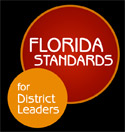Columbia County School Chief Speaks Out: Supports Change in State Accountability
Posted Sept. 27, 2015 09:55 am
COLUMBIA COUNTY, FL – On Friday, School Superintendent Terry Huddleston spoke out about school/state accountability: "I have spent the past 2 1/2 days meeting with 63 of 67 superintendents. As a group we have reached a point where we no longer have any confidence in the present accountability system.
I believe there should be accountability, but I can no longer support a system that is unfair to students, teachers, principals, schools, the district and our community. The time is right, to bring about change. If we come together and let our voices be heard as one, strong, unified group, we can make a difference for students in Columbia County, as well as, students all across the state.
Supt. Huddleston provided the Florida Assoc. of District School Superintendents remarks of the subject
Florida superintendents have lost confidence in the accountability system
TALLAHASSEE, FL - This week, the Florida Association of District School Superintendents (FADSS) met with Commissioner Pam Stewart regarding concerns with testing and the accountability system. At the conclusion of the meeting, FADSS indicated they would consider her comments and provide a statement reflecting the universal agreement of the organization.
The superintendents of Florida acknowledge the Commissioner's role and the difficulty of the tasks set before her. Florida superintendents have consistently defended and supported accountability, the new Florida Standards, and the need to accurately measure student performance. At this time, FADSS is compelled to provide a position regarding the recent actions of the Department of Education (DOE) and the State Board of Education (SBE).
Florida district school superintendents have lost confidence in the current accountability system for the students of the State of Florida.
As was stated in the recently released validity study by Alpine: "The precise magnitude of the problem is difficult to gauge with 100% accuracy, but the evaluation team can reasonably state that the spring 2015 administration of the FSA did not meet the normal rigor and standardization expected with a high-stakes assessment program like the FSA." (Independent Verification of the Psychometric Validity for the Florida Standards Assessment Executive Summary, Findings, page 11).
FADSS Recommendations
1. Suspend any application of the results from the spring 2015 administration of the FSA to students, teachers and schools. In this high stakes environment students, teachers, and schools should not be impacted by a rushed and flawed administration of new, untried assessments. While direct negative consequences were avoided for students, the results of a flawed assessment will impact teacher evaluations (VAM) and be used to judge the quality of schools.
2. Issue an "I" (Incomplete) if necessary, to all Florida schools for 2014-2015, based upon the availability of limited and flawed data. For example, 5 out of 8 (63%) of the components for the elementary school grade will NOT have data available. In addition to significant issues with the initial administration of the FSA, validity, and lack of learning gains for the grading model are also concerns. It is important to note that when faced with similar challenges at least seven other states have modified their accountability system for the baseline year to mitigate negative consequences: Arizona, Colorado, Georgia, Michigan, Nevada, Pennsylvania, and Wisconsin.
3. Reject the concept that the standards set for the FSA mirror the levels of the National Assessment of Educational Progress (NAEP). There is no evidence that NAEP is fully aligned to or measures the Florida Standards. This notion directly circumvents the work of the Education and Reactor panels composed of Florida education stakeholders.
According to the National Assessment Governing Board, "NAEP is a representative-sample assessment. It reports on the achievement of large groups of students, and does not give results for individuals or schools. Participating schools are selected by the National Center for Education Statistics and its contractor according to a sampling frame in order to produce results that are nationally representative and also representative of participating states and urban districts."
A specific question on their website asks, "Can I use NAEP results to find out how a participating school or student did?" Their answer, "No. NAEP is a representative-sample assessment, designed to report group results, and cannot provide accurate data on individual students and schools. By law, the assessment is required to make sure that all personally identifiable information about students and schools remains confidential."
Clearly, the two assessments have different purposes.
4. Conduct an extensive review of the accountability system, including the multiple changes that have been implemented over the last several years. Special attention needs to be given to learning gains so that a year's growth in a year's time is considered a learning gain.
In addition to the negative impact on students, teachers and schools, a flawed accountability system will have an adverse economic impact on Florida communities.
We have witnessed the erosion of public support for an accountability system that was once a model for the nation. Florida school superintendents stand ready to work with all stakeholders and the Department of Education to develop a viable accountability system and regain the trust of our students, teachers, parents and communities.

 From
combined press releases
From
combined press releases